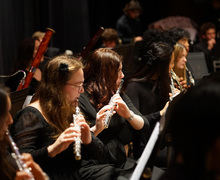SUNY ESF collects community feedback for sustainability plan at drafting event
Joe Zhao | Assistant Photo Editor
The campus community is invited to review and provide feedback on ESF’s first Sustainability Action Plan draft. Different colored pens represented students, faculty or staff, and different colored sticky notes represented either valuing or feeling concerned about the action being discussed.
Get the latest Syracuse news delivered right to your inbox.
Subscribe to our newsletter here.
SUNY ESF community members shared feedback on the university’s first draft of its Sustainability Action Plan at the ESF Gateway Center Tuesday afternoon.
During the social, attendees put sticky notes on several whiteboards — which were designated for different action items of the plan — to represent their opinions on said provisions. The event’s attendees said they appreciated having a voice in the process but held some concern.
At the start of the fall semester, SUNY announced it would form a Sustainability Advisory Council, a group of faculty, staff and students tasked with working closely with SUNY administrators to develop sustainable practices and ideas for a potential “SUNY-wide Climate Action Plan,” according to a Sept. 22 press release. Two representatives from ESF, President Joanie Mahoney and undergraduate student Isabel Valentín, are members of the council.
“To achieve these goals, the Sustainability Advisory Council will be instrumental in supporting sustainability initiatives across all SUNY campuses, ensuring campus leaders, faculty, staff, and students have a voice and contribute their insights,” SUNY Chancellor John King, Jr. said in the release.
Throughout the academic year, ESF has been working to develop its plan and presented the draft at Tuesday’s event. The document lists an organized set of proposals, which outline strategies for reducing the negative environmental impact on ESF’s campus.
The draft organizes ESF’s goals into five sections: academics, administration, community engagement, facilities and inclusion, diversity, equity and access. Within each portion, the plan lists specific recommendations — which it refers to as “actions” — to adopt more sustainable practices in its respective categories.
Henry Aymes, a junior environmental biology major at ESF, said he was glad the university was collecting student feedback. He said he had concerns that not all suggestions would receive equal attention, citing how each attendee’s feedback was separated by a different color pen.
“This is probably the least performative event that I’ve seen (because) we do get a vote,” Aymes said. “I don’t know how much my votes are gonna count because I have to use a special color pen, blue, so they know that I’m just a student.”
Though ESF is accepting student feedback, Aymes said the administration could still do more to promote sustainability on campus, such as removing its grass quadrangle.
“We’re good but they could be better,” Aymes said. “I know they claim we need (the grass quadrangle) but I don’t really feel like we do.”
Lisa Steinberg, an ESF senior studying environmental studies and a student employee at the university’s Office of Sustainability, said she believes the event encouraged collaboration among community members to discuss the environmental impact of the campus.
“I know a lot of people have never even heard about the Sustainability Action Plan and having this event here is making people really confront it,” Steinberg said. “They are face to face with this reality that we’re in right now and I think that’s definitely doing more good than harm.”
Delaney Demro, sustainability planning and institutional alignment manager at ESF, said she wanted to emphasize feedback from the student body on environmental issues.
“If there’s anything that we’ve missed the mark on so far, we’ve gotten a lot of constructive feedback on how to address that issue appropriately,” Demro said. “ESF is a school of environmental scientists and forestry students, so they really want to see positive environmental change and are happy to provide input.”
Demro also said events like Tuesday’s help improve engagement among the student body, which she said was negatively impacted during the pandemic.
Aymes shared a similar sentiment but added that ESF needs to do a better job at advertising similar events. ESF will hold multiple tabling events, which will allow attendees to fill out a survey regarding the SAP, in its Gateway Center throughout the week.
“Having more events like this where people can connect with one another and provide input on how they want to see the college change the future is crucial,” Demro said.
Published on February 7, 2024 at 1:18 am






